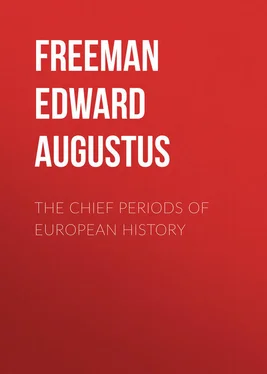Edward Freeman - The Chief Periods of European History
Здесь есть возможность читать онлайн «Edward Freeman - The Chief Periods of European History» — ознакомительный отрывок электронной книги совершенно бесплатно, а после прочтения отрывка купить полную версию. В некоторых случаях можно слушать аудио, скачать через торрент в формате fb2 и присутствует краткое содержание. Жанр: foreign_antique, foreign_prose, на английском языке. Описание произведения, (предисловие) а так же отзывы посетителей доступны на портале библиотеки ЛибКат.
- Название:The Chief Periods of European History
- Автор:
- Жанр:
- Год:неизвестен
- ISBN:нет данных
- Рейтинг книги:4 / 5. Голосов: 1
-
Избранное:Добавить в избранное
- Отзывы:
-
Ваша оценка:
- 80
- 1
- 2
- 3
- 4
- 5
The Chief Periods of European History: краткое содержание, описание и аннотация
Предлагаем к чтению аннотацию, описание, краткое содержание или предисловие (зависит от того, что написал сам автор книги «The Chief Periods of European History»). Если вы не нашли необходимую информацию о книге — напишите в комментариях, мы постараемся отыскать её.
The Chief Periods of European History — читать онлайн ознакомительный отрывок
Ниже представлен текст книги, разбитый по страницам. Система сохранения места последней прочитанной страницы, позволяет с удобством читать онлайн бесплатно книгу «The Chief Periods of European History», без необходимости каждый раз заново искать на чём Вы остановились. Поставьте закладку, и сможете в любой момент перейти на страницу, на которой закончили чтение.
Интервал:
Закладка:
LECTURE II.
ROME THE HEAD OF EUROPE
In my last lecture I strove to draw a picture of the Mediterranean lands at the moment when the Greek world, as the Greek world had been shaped by Macedonian conquest, a world of kingdoms, federations, and single cities, a busy and intricate system full of the deepest political lessons at every step, was suddenly startled by the invasion of a power from the West. That power had already slowly risen to the first place in its own Western world; it now sprang as in a moment to the first place in the East; but, having thus sprung to the first place, it was content to fall back on its former slow and piecemeal course. Generations had to pass away before the paramount influence in the Greek world which Rome won at a single grasp was fully changed into immediate dominion over every land and city to which its influence had spread. Very early in the second century B.C. Rome was already the paramount power in the Greek world. She had not a single province east of Hadria; but cities, confederations, kingdoms, all knew that she was practically their mistress. Late in the first century A.D. Rome had many provinces east of Hadria; her immediate dominion had become the rule, and even nominal independence was the exception; but there were still free Greek cities which Vespasian deemed it prudent to bring under his immediate dominion, and there were not a few other free Greek cities which Vespasian left to give Trajan an opportunity of respecting the faith of treaties. The first step in short was sudden and swift; every later step was slow; but the first step carried every later step with it as its necessary consequence. In the interval between the First and Second Punic Wars, Rome appeared east of the Hadriatic as the deliverer of Greek cities from the pirates of Illyricum. That was in truth the first step in that eastward march by which, five hundred and fifty years later, Rome herself, in her own person, followed in the wake of her dominion, and transferred her seat from the seven hills by the Tiber to the seven hills by the Bosporos. Or shall we say that the first step was taken at a far earlier time? The position of Rome as an Italian state, ruling over Greek allies and subjects, but in return deeply affected by Greek influences of every kind, had begun while Rome still dwelled in her own peninsula. Before she crossed the Hadriatic, she had begun to put on the character of that compound power, politically Roman, intellectually Greek, whose calling it was to leaven the world. The extension which was marked, in the later half of the third century, by the Roman alliance with Apollônia, Epidamnos, and Korkyra, was an extension only geographical. The ally or mistress, whichever name we choose, of Naples, Tarentum, and Syracuse, the undoubted mistress of the greater half of Sicily, had already begun to put on the character of a Greek power before she drew sword for or against any city of the elder Greece. Rome had entered the ranks of the Hellênismos before Corinth admitted her citizens to strive in the games of the Isthmos, before Athens honoured them with initiation into the holiest rites of Dêmêtêr and her Child.
In a lecture of my former course I pointed out some of the physical conditions which made it possible for Rome to rise to the headship of the world. The course of all history, I then ventured to say, had been determined by the geological fact that certain hills by the Tiber were lower and nearer together than the other hills of Latium. If I were lecturing on Roman history as such, instead of taking a glance of a moment, a glance of a mere thousand years or so, at Rome in her œcumenical position, I might carry out this thought into great detail. For my present purpose it is enough to say that the central spot of the central peninsula was naturally called to headship. We might point out that the process which made Lugubalium and Nisibis bulwarks of Rome began when the Palatine and the Capitoline hills were girded by a single wall. But it is enough for us to mark the great steps in the advance of the Roman power, the steps which made her the head of Latium, the head of Italy, the head of the West, the head, and in the end the mistress, of the Mediterranean world. In all these stages we must ever bear in mind that the rule of Rome was in the fullest sense the rule of a city, a rule of essentially the same kind as the rule of other ruling cities before and after. It was distinguished from the rule of Athens, Sparta, Carthage, Bern, and Venice only by the vastness of the scale to which the rule of the Roman city extended, and by the process, unparalleled in the history of any other city, by which the franchise of the ruling commonwealth was gradually extended to all its allies and subjects. Latium, Italy, the Mediterranean world, were merged bit by bit, not only in the Roman dominion but in the Roman city, till every Italian ally, every Greek confederate, even every barbarian provincial, had become a citizen of Rome. It is true that the last stage of the process did not take place till to be a citizen of Rome simply meant to be a subject of Rome’s master. It has been doubted, with no small show of reason, whether the edict of Antoninus Caracalla was not an immediate loss rather than an immediate gain to those whom it admitted to the full honours of the Roman name. But the eye of universal history looks at the change in another light. The edict of Antoninus, whatever its immediate motives, whatever its immediate results, did in the end create an artificial Roman nation throughout the Roman dominion, at any rate from the Ocean to Mount Tauros. Every freeman throughout the Empire had now a right in the name and traditions of Rome. We see the results of this change in the men of the fifth and sixth centuries, in those Romans of Gaul and Spain who knew no national name, no national being, save that of the city to which their forefathers had bowed. We see its yet more lasting results in the Romans and the Romania of the East, in the Greek-speaking folk from whom the Roman name has not yet wholly passed away, in the Latin-speaking folk to whom in our own day the Roman name has again become the living badge of their regenerate being.
On Rome then, as head of Europe in a sense in which no other among the powers of Europe ever reached that headship, the two duties of a great European power were laid in a fulness in which they were never laid on any other. Rome was called on, before all others, to be the teacher of nations of her own European stock, to be the champion of Europe against the inroads of barbarians from without. In the former character her teaching had sometimes to be sharp; she had often to wield the rod of as stern a discipline as that with which Gideon taught the men of Succoth. It was the mission of Rome to make the Gaul the partaker of her tongue and culture. It was her mission to make the Teuton the heir of one half of her political power. She was to frame out of his stores and her own a third state of things distinct from either of the elements that went to frame it. Of the union of Teuton and Roman sprang the world of modern Europe. But for that union the nations had to bide their time; as in the games of Hellas, they that rose before the happy moment were scourged back again. They who came as invaders only had to be dealt with as invaders and not as disciples. The Gaul who came before his time had his scourging at Sentinum; the Teuton who came before his time had his scourging at Aquæ Sextiæ and Vercellæ. But how well the work was done with Gauls and Teutons who better knew their time and place, we see when the Gaul Sidonius paints in his Roman speech the portrait of one Theodoric, Gothic lord of a Roman realm; we see it when a greater Theodoric, Gothic lord of a mightier Roman realm, legislates from his throne at Ravenna for the welfare of Rome’s earliest Gaulish province. Here was one side of the mission of the head of Europe, the teacher of the kindred nations. Her other side as European champion, as foremost representative of the Eternal cause, stands forth in her long warfare with the Carthaginian, the Persian, the Arab, and the Turk. And both sides stand forth together when Rome, lady of the nations, marches forth with her Teutonic comitatus round her to meet the hosts of Attila. The work was well in doing when Anianus looked from the walls of Orleans on the banners of deliverance, Roman and Gothic, flocking side by side, in the strife when Roman, Goth, and Frank, Catholic, Aryan, and heathen, joined to deal the final blow for the common European soil on the day of slaughter in the Catalaunian fields.
Читать дальшеИнтервал:
Закладка:
Похожие книги на «The Chief Periods of European History»
Представляем Вашему вниманию похожие книги на «The Chief Periods of European History» списком для выбора. Мы отобрали схожую по названию и смыслу литературу в надежде предоставить читателям больше вариантов отыскать новые, интересные, ещё непрочитанные произведения.
Обсуждение, отзывы о книге «The Chief Periods of European History» и просто собственные мнения читателей. Оставьте ваши комментарии, напишите, что Вы думаете о произведении, его смысле или главных героях. Укажите что конкретно понравилось, а что нет, и почему Вы так считаете.












